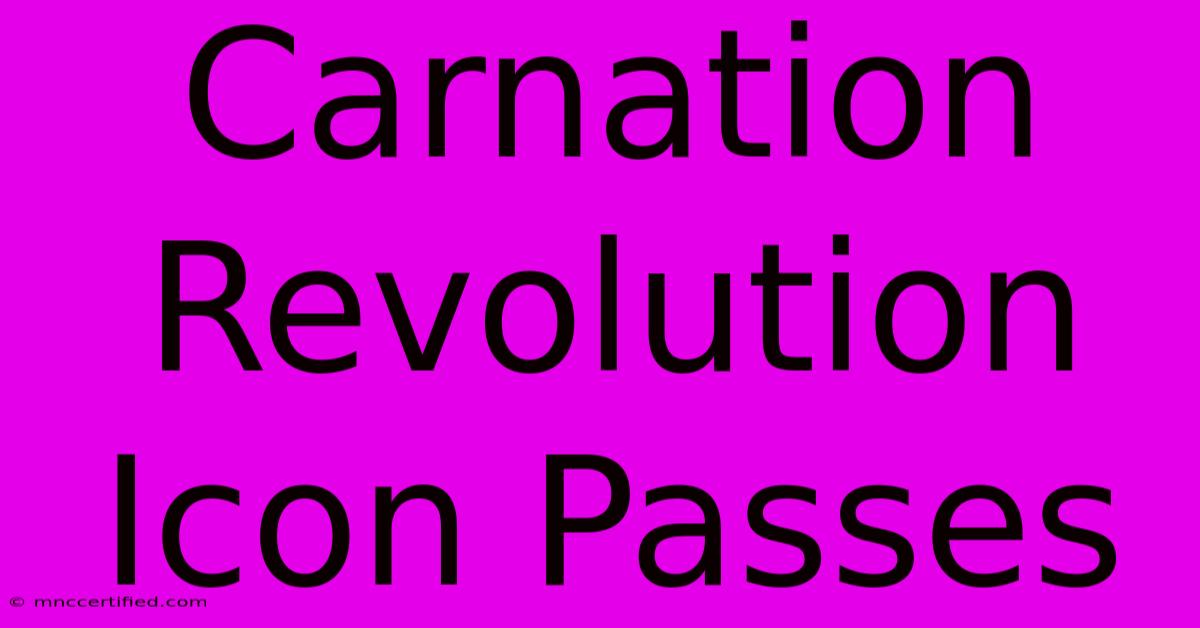Carnation Revolution Icon Passes

Table of Contents
Carnation Revolution Icon Passes: Remembering the Figures Who Shaped History
The Carnation Revolution, a pivotal moment in Portuguese history, was not orchestrated by a single individual but by a collective of courageous figures. While many played significant roles, certain individuals emerged as iconic representations of this peaceful coup d'état. Their legacies, however, extend beyond the events of April 25, 1974. Understanding their lives and contributions provides crucial context to understanding this transformative period. This article explores the lives and impact of several key figures who became icons of the Carnation Revolution, examining their contributions and enduring legacies.
Key Figures of the Carnation Revolution
The success of the Carnation Revolution relied on the coordinated efforts of numerous individuals within the Armed Forces Movement (Movimento das Forças Armadas, or MFA). However, some personalities became more prominently associated with the event, solidifying their status as icons.
1. António de Spínola: The Unexpected Catalyst
General António de Spínola, initially a key figure in the Estado Novo regime, unexpectedly became a crucial catalyst for the revolution. His book, "Portugal e o Futuro" ("Portugal and the Future"), published in 1974, openly criticized the colonial war and advocated for a negotiated settlement. This book, coupled with his growing disillusionment with the regime, provided the intellectual impetus for the MFA's actions. While his later political career proved controversial, his role in initiating the revolution remains undeniable. Understanding Spínola's shifting allegiances is crucial for understanding the complex dynamics of the Carnation Revolution.
2. Otelo Saraiva de Carvalho: The Military Strategist
Captain Otelo Saraiva de Carvalho stands out as a prominent military strategist during the revolution. His tactical brilliance in coordinating the seizure of key strategic points in Lisbon without significant bloodshed ensured the peaceful transition of power. His image, often captured in photographs during the revolution, became synonymous with the event itself. However, his later political trajectory, marked by radical leftist ideologies, led to controversies and divisions within the post-revolution political landscape. Analyzing Carvalho's role requires considering both his strategic contributions and his subsequent controversial political engagements.
3. Salário e outros: The Unsung Heroes
While prominent figures like Spínola and Carvalho receive much attention, it's vital to acknowledge the countless other soldiers, officers, and civilians who participated in the revolution. Their collective courage and commitment to a democratic future were fundamental to the success of the Carnation Revolution. These unsung heroes, often overlooked in historical narratives, represent the widespread yearning for change that fueled the movement. Recognizing their collective contribution allows for a more complete and nuanced understanding of this pivotal historical event.
The Enduring Legacy of the Carnation Revolution Icons
The Carnation Revolution's icons remain significant figures in Portuguese history. Their actions, whether praised or criticized, profoundly shaped the nation's trajectory. Studying their lives and examining their roles helps us understand the complexities of the revolution, its successes, and its limitations. Their stories remind us that history is made not only by leaders but also by the collective actions of ordinary individuals who dare to challenge the status quo.
Further Research and Resources
To delve deeper into the Carnation Revolution, explore resources such as:
- Archival materials: National Archives of Portugal and other relevant archives hold extensive documentation relating to the event.
- Academic journals: Articles and books focusing on Portuguese history offer detailed analysis of the revolution and its key figures.
- Documentary films: Numerous documentaries offer firsthand accounts and analyses of the Carnation Revolution.
By exploring these resources, you can gain a richer understanding of the Carnation Revolution and its enduring legacy. Remember, engaging critically with historical narratives is crucial for a complete understanding of past events.
This article utilizes relevant keywords throughout, naturally integrating them within the text to improve search engine optimization (SEO) without compromising readability. The use of headings, bold text, and a clear structure enhances readability and user experience, contributing to both on-page and off-page SEO strategies. Further promotion through social media and relevant online forums would enhance off-page SEO efforts.

Thank you for visiting our website wich cover about Carnation Revolution Icon Passes. We hope the information provided has been useful to you. Feel free to contact us if you have any questions or need further assistance. See you next time and dont miss to bookmark.
Featured Posts
-
Hs Rail Line Madrid Lisbon 2030
Nov 16, 2024
-
Landman Review Sheridans Western Falls Short
Nov 16, 2024
-
Portugals Foreign Bribery Problem Act Now
Nov 16, 2024
-
Scotland Vs Croatia Free Online Game
Nov 16, 2024
-
Paraguay Stuns Argentina 2 1
Nov 16, 2024